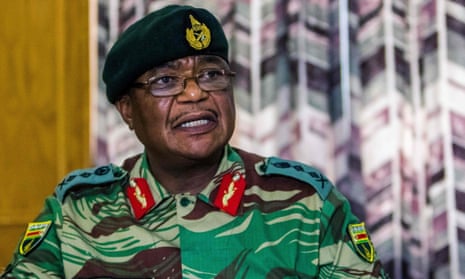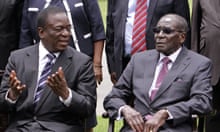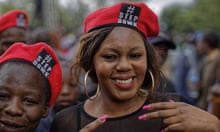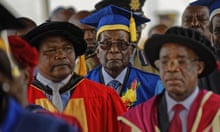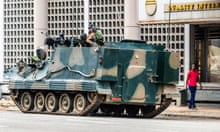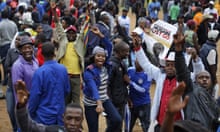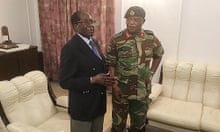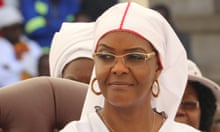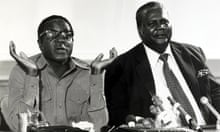When one of the architects of Zimbabwe’s low-key coup landed in Beijing last week he was met by two of the most senior members of the world’s largest military force.
“China and Zimbabwe are all-weather friends,” the head of the Zimbabwe Defence Forces (ZDF), Gen Constantino Guveya Chiwenga, was told by Li Zuocheng, chief of the joint staff of China’s People’s Liberation Army (PLA), according to a defence ministry report.
Zimbabwe, Chiwenga told his host, was “willing to deepen exchanges and cooperation in all fields with China to promote the rapid development of bilateral state and military relations between the two countries”.
Two days later, the ZDF chief sat down with China’s defence minister, Gen Chang Wanquan, thanking him for Beijing’s “long-time selfless help”.
Little else is known about why Chiwenga, who is seen as an ally of Zimbabwe’s ousted vice-president, Emmerson Mnangagwa, made the call on the Chinese capital, just days before the army chief would declare that the military was ready to “step in” over Robert Mugabe’s purge of the ruling party.
ProfileWho is Emmerson Mnangagwa?
Show
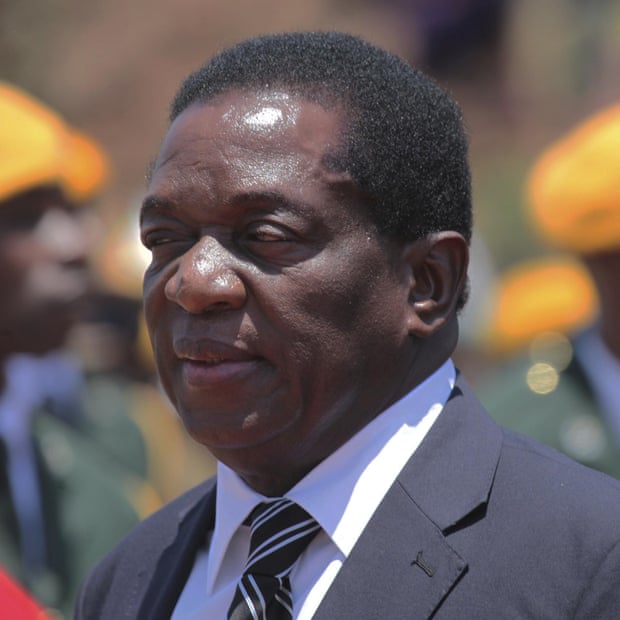
Emmerson Mnangagwa was sworn in as president of Zimbabwe on 24 November, capping a dramatic few weeks that began when he was sacked as vice-president by Robert Mugabe on 6 November.
Mnangagwa, a 75-year-old former intelligence chief, had been locked in a battle with the first lady, Grace Mugabe, to succeed her husband as president.
His sacking – an attempt to clear Grace's path to power - was a tactical error that triggered a military takeover, Mugabe's impeachment by parliament, and his resignation.
Mnangagwa has strong support within the security establishment and among veterans of Zimbabwe’s 1970s guerrilla war, when he earned the nickname “the crocodile”.
Despite allegations about his role in atrocities in the 1980s, much of the international community had long seen him as being the most likely figure in Zimbabwe to guarantee a stable transition and implement economic reforms.
China, which has backed Mugabe since the anti-colonial struggle of the 1970s, is also now Harare’s largest foreign investor, pumping huge sums into the Zimbabwean economy in exchange for natural resources and agricultural products such as diamonds and tobacco.
Recent years have seen China or state-linked Chinese firms bankroll developments including the $100m Zimbabwe National Defence College and the $200m Longcheng Plaza shopping centre in Harare. Last year China agreed to help fund a new 650-seat parliament building in the north of Zimbabwe’s capital.
On Wednesday, as the 93-year-old strongman president was placed under house arrest in Harare, the foreign ministry spokesman Geng Shuang claimed Chiwenga’s visit had been part of “a normal military exchange”. Geng was cagey, however, about what exactly Chiwenga had been doing in China: “As for the details of his visit, I have little to share.”
Geng also tried to scotch speculation that after his sacking last week, Mnangagwa had fled to China, where he is reported to have received military training in the past.
“I can assure you that he is not in China,” Geng said.
Those ambiguous comments will do little to dispel suspicions that Chiwenga may have travelled to Beijing to warn China’s leadership of the impending move against Mugabe, or perhaps even to seek its blessing or help. Li Zuocheng, a rising star in China’s 2.3 million-member military, reportedly enjoys close ties to the Chinese leader, Xi Jinping.
Shen Xiaolei, an Africa expert from the state-run Chinese Academy of Social Sciences, rejected the suggestion China had been in on the coup. “Chiwenga’s visit was arranged long ago, so it’s impossible he visited China over this matter,” he said.
Shen said Beijing would respect Zimbabwe’s “own attitudes” towards the crisis. Mugabe’s downfall was “a pity” since “he was the leader and hero of national independence and such a situation has come late in his life … However, the Chinese government has [a policy of] non-interference in Africa’s internal affairs.”
Cobus van Staden, a South African academic and journalist who specialises in China-Africa relations, said it was impossible to know whether China had played an active role in the move against Mugabe.
“Who knows what really is happening – but it certainly is eye-popping … the timing [of the visit] does raise questions,” said Van Staden, from Witwatersrand University in Johannesburg.
“It’s a more bunch of loose clues than a coherent narrative at the moment but it certainly does point to Chinese involvement in some kind of way.”
TimelineZimbabwe timeline: the week that led to Mugabe's detention
Show
Robert Mugabe fires his powerful vice-president, Emmerson Mnangagwa, clearing the way for his wife, Grace, to succeed him as leader of Zimbabwe. Grace had accused 75-year-old Mnangagwa, a former intelligence chief, of being the “root cause of factionalism” in the ruling Zanu-PF party.
Mnangagwa reportedly flees to South Africa, but vows to return to Zimbabwe to lead party members. The party "is not personal property for you and your wife to do as you please," Mnangagwa tells Mugabe in an angry five-page statement.
Zimbabwe’s army chief demands a halt to the purge in Zanu-PF, and warns that the military could intervene. “We must remind those behind the current treacherous shenanigans that when it comes to matters of protecting our revolution, the military will not hesitate to step in,” General Constantino Chiwenga told a media conference attended by about 90 senior army officers.
A convoy of tanks is seen moving on the outskirts of the Zimbabwean capital but the military denies a coup. In an overnight declaration on state television, they say Mugabe is safe and they are "only targeting criminals around him".
Military vehicles take control of the streets of Harare in the early hours. South Africa says Mugabe has told its president, Jacob Zuma, by telephone that he is under house arrest but is "fine".
Ian Taylor, the author of China’s New Role in Africa, said Beijing would not be losing too much sleep over events in Zimbabwe since Mugabe’s apparent demise did not yet appear to represent “a change in system”.
“The securocrats who have seized power have had close and profitable relations with Beijing and would wish this to continue,” said Taylor, an international relations professor at St Andrews University.
“Only if the situation spun out of control and a genuinely new and different set of people came to power would China’s position be conceivably in jeopardy.”
There were hints from Chinese media and analysts on Thursday that Beijing was indeed comfortable with the end of Mugabe’s 37-year reign.
“Wednesday’s incident will not affect the general trend of bilateral ties,” the party-run Global Times, which sometimes reflects official views, argued in an editorial. “The long-term friendship between China and Zimbabwe will transcend the internal disturbances in Zimbabwe.”
The Global Times predicted that the west – given its hostility to Mugabe – was “likely to turn a blind eye to this crisis”.
Taylor suggested Beijing was likely to do the same: “The Chinese are very pragmatic.”
Van Staden said that as well as the economic benefits of its relationship with Mugabe, Beijing also felt a historical loyalty to a man with whom it had worked since the Mao era when he helped China gain influence in Africa after the Sino-Soviet split.
China also “wasn’t blind to the fact that supporting Mugabe – even though it drew criticism from the west – carried a certain amount of cachet in Africa” where some still revered him for his fight against colonialism.
Now, however, Beijing’s calculations appeared to have changed.
“It seems to me that they just realised – like everyone has realised – that the situation in Zimbabwe was increasingly untenable, that a direct succession from Robert Mugabe to Grace Mugabe was a recipe for disaster,” he said.
“China doesn’t have necessarily an ideological attachment to democratic government or to non-democratic government. The only thing China is generally really, really focused on is stability.
“My feeling is that perhaps they saw that this was going to start becoming a very disrupted country if there isn’t some form of changeover.”
- Additional reporting by Wang Zhen
